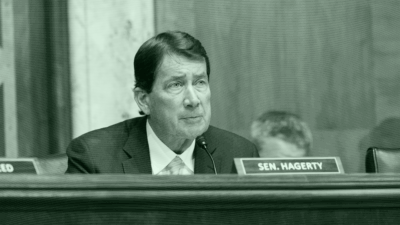Financial Advisors Are On the Fence About Bitcoin ETFs
As cryptocurrency flirts with record highs, the new ETF products may help advisors gain exposure to a highly volatile asset class.

Sign up for market insights, wealth management practice essentials and industry updates.
The launch of bitcoin ETFs may have softened crypto’s image as the ‘Wild West’ of Wall Street, but some financial advisors are already circling the wagons.
After getting the regulatory green light in January, spot bitcoin ETFs that hold actual cryptocurrency have been off to a blistering pace. The funds vacuumed up more than $12 billion in assets in the first four months of trading, and the two frontrunners, BlackRock and Fidelity Investments, both matched industry records by topping $1 billion in inflows in a matter of days. Invesco, Grayscale, and famed investor Cathie Wood’s Ark Invest have also launched competing products.
More than one in three financial advisors now say they plan to recommend digital assets to clients in the next six months, according to data from the Digital Assets Council of Financial Professionals. That’s up from just one in five financial advisors that were reportedly considering crypto six months ago.
As the asset class flirts with record highs, the new ETFs may help advisors find relatively safe ways for clients to catch the crypto upside.
Not All That Glitters
Still, major industry players maintain that crypto just isn’t suitable for clients’ investments. The Vanguard Group said the funds “create havoc within a portfolio,” in a January blog post, adding that the asset class has “little history” and “no inherent economic value.”
Noah Damsky, principal of Marina Wealth Advisors in Los Angeles, said the new funds aren’t necessarily in the best interest of his mostly high-net-worth clients. “[Crypto] has no identifiable value, it doesn’t produce cash flow, and it’s speculative and volatile,” he said. “We don’t view these characteristics as a store of value.”
Bitcoin ETFs Rollouts
That’s not stopping national firms like Wells Fargo and independent broker-dealer Cetera Financial Group from opening up access for advisors. Cetera approved four bitcoin ETFs in March, along with strict limits on the amount clients can purchase. Cetera and its divisions own roughly $22.5 million in crypto ETFs, according to reported data.
Wells Fargo, along with most other wirehouses, allows advisors to invest in the funds only if clients ask for them on their own.
“We appreciate the fact that advisors are being asked about these products by their clients,” Cetera’s head of investment products Matt Fries said in an email. “We are here to support them.”
Here’s how advisors are recommending the products to their clients, according to the DACFP survey released in May:
- More advisors are recommending crypto following the launch of spot bitcoin ETFs. Some 85% of the advisors surveyed suggested allocations of more than 1% of a client’s overall portfolio.
- The vast majority of advisors that use crypto (87%) are recommending that clients allocate no more than 5% of their total assets. Most advisors (31%) recommended an allocation of 2%.
So Who’s Buying?
While hard numbers on Bitcoin ETF purchases aren’t readily available, recent data from 13-F regulatory filings are shining a light on those transactions. Some 563 investment firms reported owning $3.5 billion worth of bitcoin funds as of the first week of May, including top wealth management companies like Sequoia Financial Advisors and Hightower, according to an analysis by the cryptocurrency asset manager Bitwise. Professional investors make up no more than 10% of the $50 billion invested in the funds, according to the filings cited by Bitwise.
The vast majority of those assets were sunk into two products: the iShares Bitcoin Trust (IBIT) and Fidelity Wise Origin Bitcoin Fund (FBTC). Not only are those two of the largest asset managers in the business, but they also offer quick account openings and streamlined custody and reporting processes.
“FBTC makes sense since clients don’t have to custody it themselves at Coinbase or hold it in cold storage,” Damsky said. “The tax reporting rolls up into their brokerage portfolio like any other portfolio position rather than separate tax documents.”
Daniel Lehrman, founder of Masuda Lehrman Wealth in Honolulu, Hawaii, said the new products can be a helpful way to participate in crypto’s gain without the potential dangers or the hassle of managing private keys. Bitcoin ETFs pass the responsibility of storing and managing crypto off to the issuer, who is then under “strict regulation and oversight,” he said.
Many financial advisors are simply taking a wait-and-see approach to the new funds. The spectacular crashes of major exchanges – like FTX, the leading cryptocurrency exchange that went bankrupt in November 2022 amid allegations of embezzlement – gave them good reason for pause.
“Clients should be aware that there are still risks associated with owning crypto depending on how it is custodied,” Damsky said. “The large majority of our clients have no interest in Bitcoin ETFs.”











